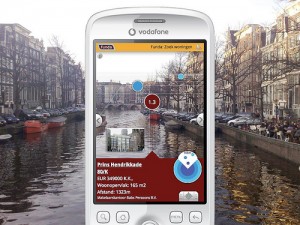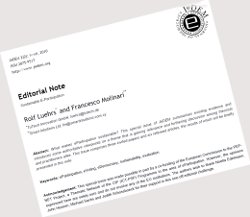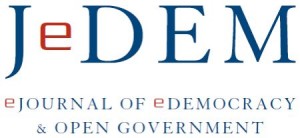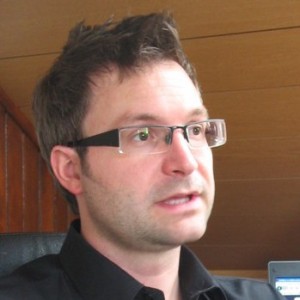Only articles in with the "eParticipation" tag are displayed
To display all articles click
here.
 |
17. December 2010 – 17:25 by John Heaven (TuTech Innovation GmbH)
|
You’ve joined us for live chats on the blog, taken part in our online discourses, chatted to us at conferences, read PEP-NET members’ articles, and downloaded the free PEP-NET Issue of JEDEM. Eighty-six of you even came to Hamburg to join us for the PEP-NET Summit. Before the year is out, we would like to ask you take part in one final activity: our survey “Looking Forward, Looking Back: eParticipation Trends in 2010 and 2011.”
So what were the main trends in 2010? What areas of eParticipation made particular progress, and what events defined the eParticipation calendar? And while you are thinking about trends, what do you think will be up and coming in 2011? Nobody can predict the future, but it will be interesting to find out how 2010 was for friends of PEP-NET, and what they expect in 2011.
When I’m back in the New Year, I’ll put together a summary of results. I think it will make for interesting reading – but only if you take part, that is!
In the meantime, from Edinburgh to Athens, Madrid to Minsk: wherever you are, Merry Christmas and a Happy New Year!
Posted in members, Trends, Visions | No Comments »
 |
8. October 2010 – 10:09 by Bengt Feil (TuTech Innovation GmbH)
|
 In January of 2010 I wrote an article about the possibilities of augmented reality in eParticipation. Three quarters of the year in augmented reality, as a method of layering information onto the real world, has developed further and looks like it is here to stay and therefore keeps being interesting for eParticipation. It however also is part of a greater challenge the eParticipation community faces.
In January of 2010 I wrote an article about the possibilities of augmented reality in eParticipation. Three quarters of the year in augmented reality, as a method of layering information onto the real world, has developed further and looks like it is here to stay and therefore keeps being interesting for eParticipation. It however also is part of a greater challenge the eParticipation community faces.
Several things hint at the coming of age of augmented reality:
- The platforms being able to use augmented reality apps have gotten more common with iOS and Android hardware having the necessary sensors and cameras and being widely successful in the market place. However with the availability of more devices the differences among them are also getting bigger (for example a gyroscope is only available in the iPhone 4 right now). This video gives a good overview of the available platforms).
- Augmented reality seems to come into the mainstream slowly as the discussion around PlaneFinder shows. This app lets you point your phone at a plane in the sky and get information like position, height and speed, and has been deemed as being possibly dangerous to airplane security. Even though augmented reality is still gimmicky in many cases new uses bubble up every day and the technology might find a strong place in mobile app use over time.
- Another hint of the growing interest in augmented reality is the time spent by developers building the apps. From September 2009 to June 2010 the number of AR apps in the Appstore rose from 83 to 480. This shows that augmented reality is still a niche but on the rise.
So what to make out of the fact that this way of displaying information on mobile devices is here to stay? For eParticipation this challenge has to be seen in the greater context of the transformation from almost all web-usage being in a standard web-browser on a computer to a multi-device (phone, tablet, TV) profile.
The eParticipation user of today might jump for one device and mode of usage (e.g. consuming information to adding content) to the other quickly and modern eParticipation platforms should be able to handle this challenge. From this angle augmented reality is just one more brick in the wall (consisting of many bricks).
I will pick up this topic in another article and try to discuss how the problem of getting eParticipation working in so many different settings could by addressed from a technical and procedural point of view.
Posted in Trends | No Comments »
 |
28. September 2010 – 16:57 by John Heaven (TuTech Innovation GmbH)
|

The PEP-NET Special Issue of eJournal of eDemocracy (JeDEM), which Francesco Molinari and Rolf Lührs guest edited, is now available at www.jedem.org. It addresses the topic “sustainable eParticipation”, asking what ‘sustainable’ means in this context and turning to experts in the field for advice on ensuring European eParticipation projects overcome problems with low participation rates and impact.
The Special Issue contains a total of nine papers, three of which are invited papers from prominent eParticipation actors. The remaining six are scientific research papers and case studies.
The authors are successful in shedding new light on eParticipation, with a wealth of hints and tips on how to make eParticipation sustainable. Here is a list of concrete prerequisites for sustainable eParticipation gathered from the various papers as part of the editorial:
- A favourable policy and legislative framework (Chrissafis and Rohen, Hinsberg);
- Official recognition from the public decision-makers (Badouard);
- Efficient (Velikanov) and transparent (Johnston) procedures for the aggregation and visualisation of user preferences;
- Trust building on the whole process (Rodrigues Filho);
- A suitable ICT infrastructure (Hinsberg, Hermida) posing weak constraints on users’ behaviour (Badouard) and making the most out of the inputs (Li);
- A community of active (Hinsberg) and skilled (Maier-Rabler and Huber) citizens;
- A participatory culture among the population (Li, Maier-Rabler and Huber).
Of course it is not possible to distil the whole journal into a single blog post – you will simply have to read the journal to benefit from the wealth of knowledge and experience that it reflects by visting https://www.jedem.org/.
The journal was ready in time for last week’s PEP-NET Summit, at which the issue of sustainability was also raised. Like the Summit, the JeDEM Special Issue benefited from PEP-NET’s unique network of eParticipation actors across Europe and will help to ensure that there is ongoing reflection on how eParticipation can make a positive, long-term contribution to our democratic culture. JeDEM is published twice per year since first being published in 2009. The Centre for E-Government at the Danube University in Krems, Austria, manages the publication process which involves a team of 35 editors.
Posted in Uncategorized | No Comments »
 |
12. July 2010 – 10:15 by Centre for E-Government
|
In collaboration with PEP-NET, the Centre for E-Government at the Danube University Krems invites you to submit an article for the third issue of the eJournal of eDemocracy and Open Government (JeDEM).
Guest Editors
- Rolf Luehrs (PEP-NET, TuTech Innovation GmbH, D)
- Francesco Molinari (SmartIntuitions Ltd., CY)
Extended Deadline: 21 July 2010
Call for Papers
The past decade has seen a significant increase in the number, variety and quality of eParticipation trials, particularly in Western and Southern European countries. The impulse of the European Parliament and the financial support by the Commission have been instrumental in establishing a pan-European community of practice, made up of academia, governments and solution providers from virtually all EU Member States.
However, on the evaluative side, many projects that were seen through to their conclusion apparently failed to meet expectations. The most evident limitations are the typically low number of active participants and the relatively poor impact of the (majority of) projects.
Although it is often taken for granted that ICT-supported political participation will be of increased importance in the future, the question of how to enhance the sustainability of eParticipation projects has not yet been convincingly answered. In times where most of the European countries have to cope with a difficult financial situation, eParticipation supporters and particularly Public Administration officials will be put under even more pressure to show that the required resources lead to tangible results and create real value for the citizens.
In this volume of JEDEM we are calling for theoretical and practical papers addressing the challenges of “Sustainable eParticipation”.
- review of successful examples of implementation
- institutional, legal, social and economic aspects of sustainable eParticipation
- ICT supported co-creation of public services
- eParticipation and Gov 2.0
- Living Labs and eParticipation
Further Info: OA eJorunal of eDemocracy and Open Government
Posted in Projects | No Comments »
 |
17. June 2010 – 15:19 by Centre for E-Government
|
 Extended Call For Papers – eJournal of eDemocracy and Open Government (JeDEM)
Extended Call For Papers – eJournal of eDemocracy and Open Government (JeDEM)
Issue 3/ September 2010
Special Issue in Collaboration with
PEP-NET: Sustainable eParticipation
Guest Editors
- Rolf Luehrs (PEP-NET, TuTech Innovation GmbH, D)
- Francesco Molinari (SmartIntuitions Ltd., CY)
The eJournal of eDemocracy and Open Government addresses the theory and practice in the areas of eDemocracy and Open Government as well as eGovernment, eParticipation, eDeliberation and eSociety. The aim is to impact the quality, visibility, efficiency and use of research and work in eDemocracy, Open Government and related fields.
Call for Papers
The past decade has seen a significant increase in the number, variety and quality of eParticipation trials, particularly in Western and Southern European countries. The impulse of the European Parliament and the financial support by the Commission have been instrumental in establishing a pan-European community of practice, made up of academia, governments and solution providers from virtually all EU Member States.
Read the rest of this entry »
Posted in experince, good practice, ICT, News, open data | No Comments »
 |
26. April 2010 – 16:14 by John Heaven (TuTech Innovation GmbH)
|

Wordle, created with wordle.net
If you have something to say about eParticipation in Central and Eastern Europe, you can still participate in the online discourse. However, the forum has closed and we have now created summaries of the discussion. Anyone can edit the summaries using Google Docs, meaning that you still have a chance to contribute until May 7th. These documents will be submitted to the European Commission in a situation paper.
Read the rest of this entry »
Posted in Events, good practice, News, Projects, Uncategorized | No Comments »
 |
23. April 2010 – 09:00 by Bengt Feil (TuTech Innovation GmbH)
|
I assembled a few articles form the last weeks I found particularly interesting and noteworthy.
But first of all: The second PEP-NET online discourse has been running since April 12th on www.internet-discourse.eu. This discussion about the barriers and potentials of eParticipation in the Central and Eastern European region has been very successful and featured (among other things) three very interesting live-discussions with eParticipation experts from Croatia, Estonia and Slovenia. You can still take part in the third phase of the discussion. More information can be found here.
Now on to articles:
Google made an interesting step in publishing which government requested data or the removal of data from them in the second half of 2009. They also provide the number of requests and specific information on what kind of removal was requested (Youtube videos, blog posts etc.). A short article on this topic can be found on PEP-NET.
Google.com/governmentrequests
Tristan Parker wrote an interesting post on the influence of financial constraints on digital government efforts. He argues that these constraints will drive government (he is talking about the UK) towards more digital government projects and efforts not for their democratic but for their financial benefits. I think this is an interesting point of view and would argue that even though economic pressure might be the impulse the result might also be an improvement of democratic processes. An in-depth analysis can be found on the pages of the Hansard Society.
Headstar.com
MySociety has managed to set up a very large survey with “information on where every candidate in every seat stood on what most people would think were the biggest issues, not just nationally but locally too” through its TheyWorkForYou project. This might be one of the most comprehensive gatherings on data on the candidates positions we ever had in an election. The results will be published on April 30th.
Mysociety.org
Lauren Ivory posted a good (and very comprehensive) presentation by Steven van Belleghem on the online networks around the world. No absolutely new information but good to have it all on one place.
Futuregovnetwork.com
The Centre for Public Scrutiny has published a report on “what internet communication technologies might mean for public accountability”. The full report can be found here.
Cfps.org.uk
Posted in News | No Comments »
 |
21. April 2010 – 09:02 by John Heaven (TuTech Innovation GmbH)
|

Photo of Simon Delakorda
Simon Delakorda, founder and Managing Director of the Institute for Electronic Participation (INePA) in Ljubljana, Slovenia, will participate in a live chat on Wednesday 21st April from 10.30-11-30 CET.
This is the third in our series of Live Chats as part of the PEP-NET Online Discourse on eParticipation in Central and Eastern Europe.
Simon is a full-time eDemocracy/eParticipation practitioner and researcher. InEPa is a PEP-NET member and a regular contributor to the PEP-NET blog.
To take part in the chat, simply go to the news item on the internet-discourse.eu website. Within that article you will see a window, which will allow you to participate in the chat when it starts. (If you go to the page before the chat starts, you will see a window where you can enter your email address for a reminder to be sent.)
You can continue to participate in the general discussion on eParticipation in Central and Eastern Europe at all times until this Friday (23rd April) by registering on the site and posting comments in the forum. The results of the discourse will be presented to the European Commission as a situation paper.
Posted in Events, Interview, Partners, Trends | No Comments »
 |
20. April 2010 – 18:08 by Rolf Luehrs
|

The first step for governments or public administrations considering setting up an eParticipation project or making use of social media for the public sector is to see what others have put in place already. But where can you find information about existing cases, tools that fit your project or even a service provider?
Here are some entry points:
ePractice.eu
ePractice.eu is a portal created by the European Commission which offers services for the professional community of eGovernment, eInclusion and eHealth practitioners. It is an interactive initiative that empowers its users to discuss and influence open government, policy-making and the way in which public administrations operate and deliver services.
Part of the portal is a database providing descriptions of cases from the different domains. If you look for cases dealing with eParticipation, eDemocracy or eVoting you have to choose the right filters (Browse by domain: eGovernment; Browse by topic: eParticipation, eDemocracy and eVoting). After that you will be presented with about 130 cases from numerous EU countries, some of which are definitely worth reading.
e-participation.net & e-participation.it
e-particpation.net was initiated by PEP-NET founding member politik digital together with the British Council. The idea was to cover cases in Germany and the UK in the first place and more than 200 projects have been listed. Unfortunately the database has not been updated since the BC funding ran out in 2009. However, it is still an interesting archive and a source of inspiration: PEP-NET member Francesco Molinari set up a copycat covering only Italian cases in Italian language. He has since collected more than 150 cases.
ParticipateDB
ParticipateDB is a collaborative catalogue of online participation tools initiated by Tim Bonnemann’s Intelletics. Although still in the “closed alpha“ phase, 134 tools, 166 projects and 70 references can be browsed by any visitor.
Participedia
Participedia is a wiki page collecting “narratives and data about any kind of process or organization that has democratic potentials”. It is not at all limited to eParticipation but quite a lot of the described cases belong to this domain.
PDF’s “who to hire”
The US based personal democracy forum (PDF) recently published the “Who to Hire” guide providing an in-depth look at 40 firms offering technology tools to clients across the political spectrum. The guide has up-to-date descriptions of each company’s software and services. It contains examples of current political clients and the results of a survey of their network of online politics professionals that the initiators used to rate each company’s pricing, software and service. The online guide is only free for PDF members – others have to pay 75$. However, PDF provides a free executive summary.
Tiago Peixoto’s participatory budgeting map
In case you are interested in participatory budgeting you should have a look at the Google map Tiago has set up. This is to my knowledge the most comprehensive collection of case studies both with and without online support
PEP-NET
Last but not least we have collected quite a lot of blogposts introducing cases and tools. Just browse by category:
tools
projects
good-practice
Does anybody know other sources? Would be happy to get some hints in the comments…..
Posted in good practice, Projects, Tools | 2 Comments »
 |
14. April 2010 – 22:57 by John Heaven (TuTech Innovation GmbH)
|

Photo of Nick Booth by aeioux on Flickr.com
Before becoming a social-media consultant and founding Birmingham-based Podnosh, Nick Booth was a BBC journalist and then ran a government quango. He advises public administrations on using social media, is involved in many projects that promote active citizenship, and is a major player on the UK’s eParticipation scene. Nick is regularly invited to speak at conferences on social media.
JH: Hi Nick. Thanks for taking the time to be interviewed for PEP-NET. First question: what does eParticipation mean to you?
Read the rest of this entry »
Posted in Uncategorized | No Comments »














